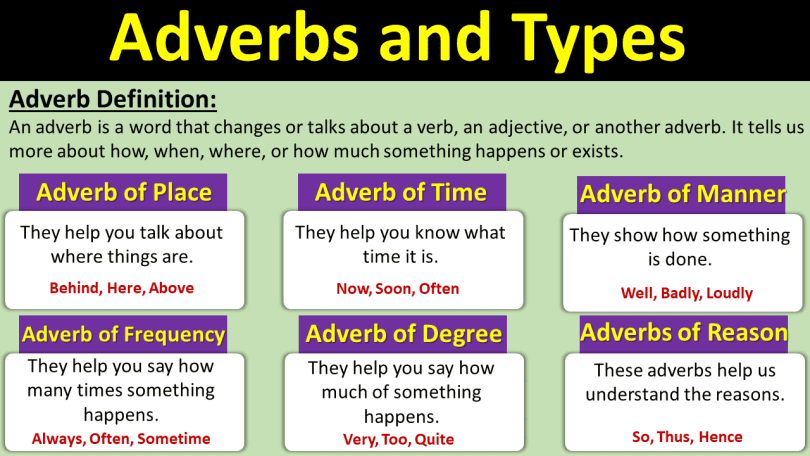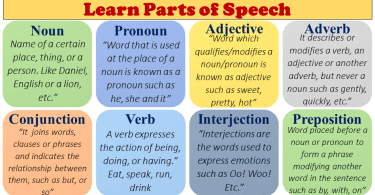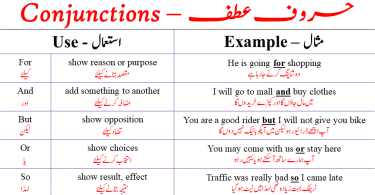Learning about different kinds of adverbs is really important for becoming good at English. Adverbs help make our sentences more interesting by changing verbs, adjectives, and other adverbs. In this helpful guide, we will talk about the different types of adverbs in English and also tell you what they mean in Urdu. Whether you’re just starting or want to get better at English, this article will help you use adverbs better.
Adverb Definition:
An adverb is a word that changes or talks about a verb, an adjective, or another adverb. It tells us more about how, when, where, or how much something happens or exists. Many adverbs in English end with ” -ly,” but there are some that don’t follow this rule.
Examples of Adverbs:
- She sings beautifully.
- He spoke softly.
- The dog jumped high.
- She runs fast.
- The bus stopped suddenly.
Important Note: Download FREE PDF File at the bottom
Types of Adverb:
- Adverbs of Time
- Adverbs of Place
- Adverbs of Manner
- Adverbs of Frequency
- Adverbs of Degree
- Adverbs of Reason
- Interrogative Adverbs
Important Note: Download FREE PDF File at the bottom
- Adverbs of Time:
These adverbs show us when something happens.
Examples: eventually, immediately, eventually, suddenly, now, soon, yesterday, today, tomorrow, always, often.
Example Sentences:
- She will start his new job soon.
- He will meet you tomorrow at the park.
- He arrived late for the meeting.
- The party is scheduled later in the evening.
- They are leaving early in the morning.
- She finished the race last.
- Adverbs of Place:
These adverbs tell us where something happens.
Examples: here, there, everywhere.
Example Sentences:
- She placed the book here on the table.
- The birds flew there to build their nests.
- The boy searched everywhere for their lost toy.
Important Note: Download FREE PDF File at the bottom
- Adverbs of Manner:
These adverbs tell us how something is done.
Examples: quickly, softly, carefully, loudly, happily, well, badly, slowly, excitedly.
Example Sentences:
- She drove carefully on the icy road.
- He ran quickly to catch the bus.
- They laughed loudly at the funny joke.
- The chef cooked the meal deliciously.
- They danced gracefully on the stage.
- He completed the puzzle easily.
- Adverbs of Frequency
These adverbs tell us how many times something happens.
Examples: always, often, sometimes, rarely, never, usually, occasionally.
Example Sentences:
- I always eat breakfast before school.
- They rarely go to the movies on weekdays.
- He usually visits his grandparents on Sundays.
- She often practices playing the piano.
- We sometimes take long walks in the park.
- They never miss their favorite TV show.
- I occasionally meet my friends for coffee.
- He hardly ever forgets his keys.
Important Note: Download FREE PDF File at the bottom
- Adverbs of Degree
These adverbs tell us how much or how strong an action is.
Examples: very, too, quite, really, extremely, fairly, almost, nearly, absolutely, utterly, completely.
Example Sentences:
- She was very excited about her birthday party.
- He’s extremely talented at playing the guitar.
- The weather is quite hot today.
- I’m completely done with my homework.
- She’s rather shy around new people.
- They are absolutely sure they will win the game.
- Adverbs of Reason:
These adverbs tell us why something happened or why someone did something.
Examples: therefore, because, so, thus, hence, accordingly, consequently, as a result, since, due to, for this reason.
Example Sentences:
- She ate an apple because she was hungry.
- He ran quickly to escape the rain.
- They studied diligently in order to pass the exam.
- I stayed home due to the bad weather.
- She smiled because she was happy.
- He apologized sincerely for his mistake.
- Interrogative Adverbs
Interrogative adverbs are used to ask questions.
Examples: Why, where, how.
Example Sentences:
- When will the party start?
- Why did she leave early?
- Where did they go for vacation?
- How did you manage to solve that puzzle?
- How much does this cost?
- How often do you visit your grandparents?
FAQ/S:
What are some questions about adverbs?
when, where, how, and to what extent
What do adverbs need to know?
Adverbs can be used to show manner (how something happens), degree (to what extent), place (where), and time (when).
What type of adverb is yearly?
Adverbs of frequency
What type of adverb is extremely?
Adverb of Degree











Leave a Comment